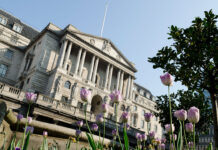Credit card spending did not see a rise
The levels of savings seen in the UK fell in July to £7.1bn, down from £9.8bn the month before, while credit card spending did not increase.
£1.4bn in mortgage debt was repaid by individuals, only the second time this has happened in the last ten years.
Children going on their summer holidays was a key factor in causing savings to rise and spending to fall, according to Laura Suter, head of personal finance at AJ Bell.
“People saved less in July than in June, with £7.1bn of money put away in the month, a nearly £3bn drop on the previous month. But it’s clear to see why people might decide to get out and spend their money instead of save it, as interest rates on deposits fell yet again to another historic low,” said Suter.
Although there was an increase in spending, this was not being driven by increased use of credit cards.
“Since the start of the pandemic last year households have paid off large sums of their credit card debt but this started to turn around earlier this year as lockdown eased and everyone got out and spent more. In July net borrowing was zero, compared to an average borrowing figure of £1.2bn a month in pre-pandemic times, showing we’ve not entirely returned to our old spending ways,” said Suter.
Suter believes that many are waiting to see what happens to the housing market upon the conclusion of the stamp duty holiday.
“July’s data suggests the market may be slowing, with £1.4bn of net repayments of mortgage debt in the month. This is something that has happened only one other time in the past decade: in April last year during the thick of the pandemic when the housing market was effectively closed. The amount we were all repaying on our mortgages stayed roughly the same as the past year, but the amount we borrowed dropped to £16.5bn – the lowest since June last year.”





